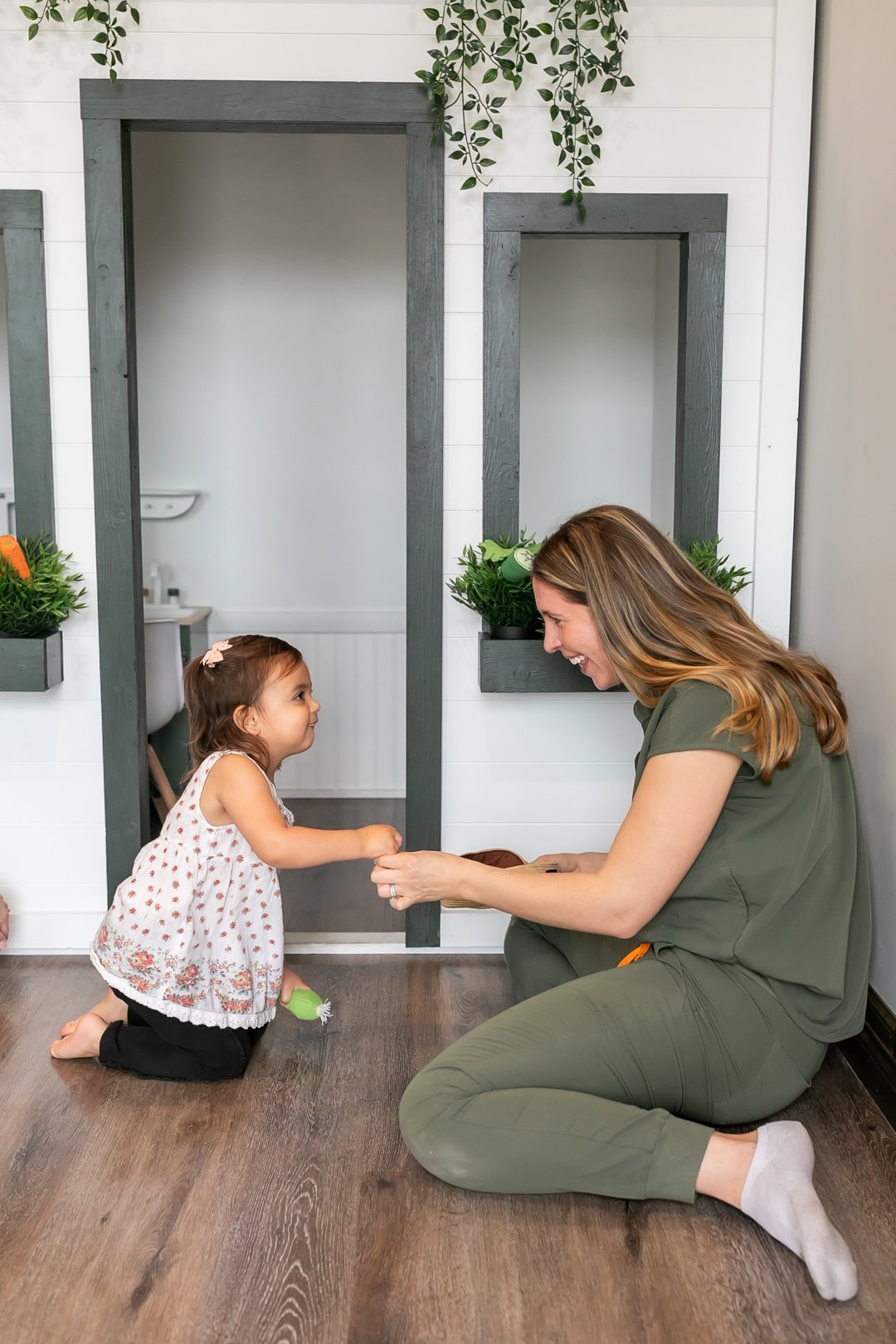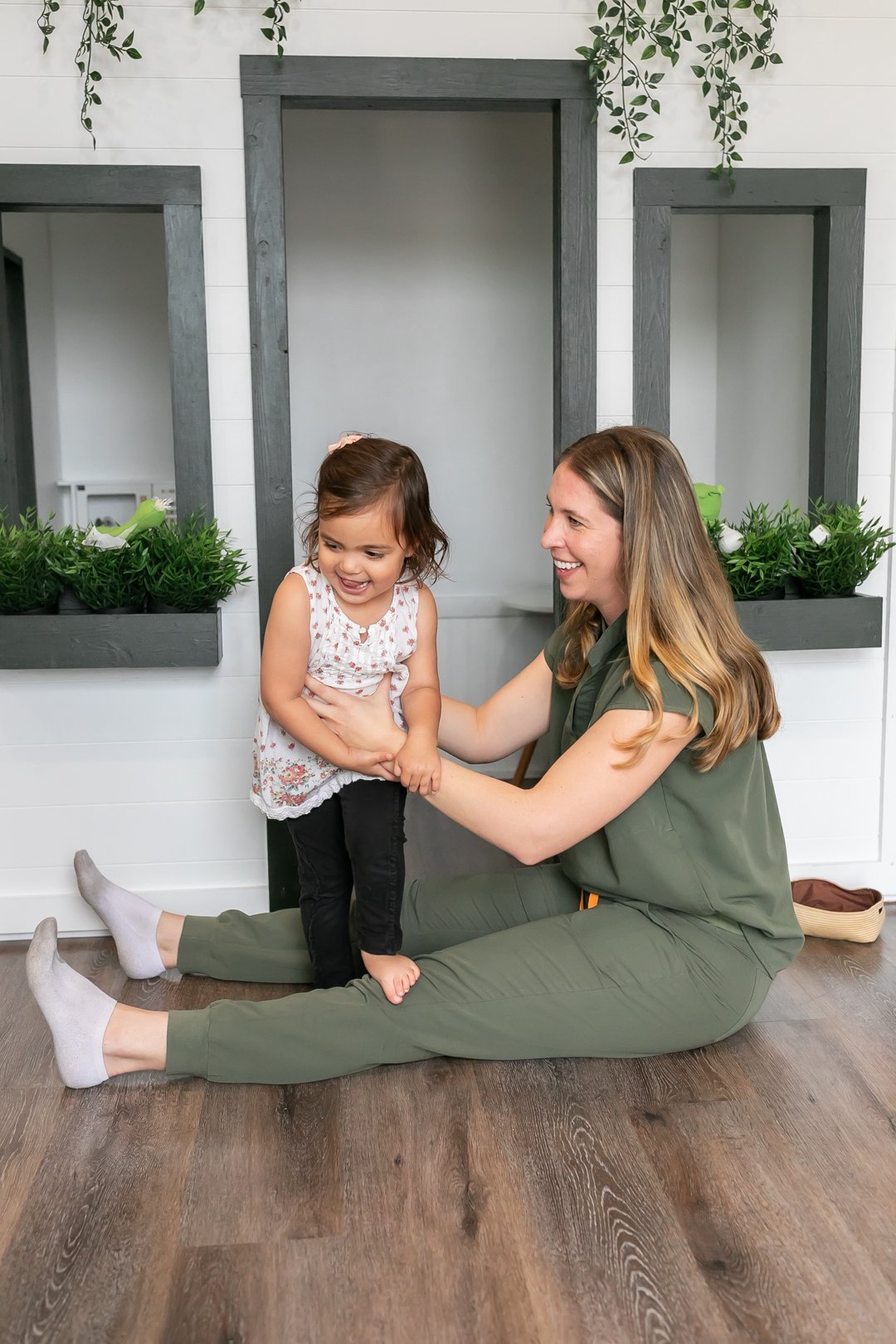
Pediatric Physical & Occupational Therapy in Austin, Texas
DISCOVER THE DIFFERENCE
WHAT MAKES US DIFFERENT
Striving together
At Strive Pediatrics, we are experts in infant and pediatric movement, don’t “wait and see” and help your child STRIVE towards independence
What distinguishes us at Strive Pediatrics is our commitment to achieving real, measurable results through a compassionate, evidence-based, and holistic approach. We believe in working closely with parents and other healthcare professionals to create comprehensive and effective treatment plans for each child.

Physical Therapy common conditions we treat
BIRTH- 10 YEARS OLD
Prematurity
Cerebral Palsy
Genetic Syndromes
Developmental Delays
Gait difficulties
Brain Trauma/injuries
Gross Motor Delay
Gross Motor Delay
Toe Walking
Autism Spectrum Disorders
Hypotonia (weakness, low tone)
Hypertonia (tightness, high tone)
Neuromuscular Conditions
Balance and Coordination Difficulties
Dynamic Movement Intervention (DMI)
Dynamic Movement Intervention (DMI) is a therapeutic technique used in Physical Therapy and Occupational Therapy to treat children with motor delay by improving automatic postural responses and promoting progress towards developmental milestones.
The goal of DMI is to provoke a specified active motor response from the child in response to defined dynamic exercises prescribed by the therapist. This comprehensive intervention incorporates current research on neurorehabilitation, technologies, and methodologies. DMI stimulates neuroplasticity to facilitate new neuronal connections and development of motor milestones. (Information sourced from the DMI website at dmitherapy.com)
WHAT TREATMENT WE INCLUDE
Physical Therapy
Our specialized team provides skilled intervention to address a child's specific medical concerns and conditions that require a skilled treatment plan, including treatment interventions, goals, and a home exercise program to help your child reach their maximum potential.
-
Gentle, hands-on techniques are used to address areas of tension, tightness, or restriction in the fascia, muscles and/or joints.
-
Play-based activities incorporate exercises to improve strength, flexibility, and motor skills, promoting the attainment of developmental milestones and laying the groundwork for healthy movement and development.
-
Techniques are employed to help children learn or re-learn movement patterns, promoting better coordination and control of muscles.
-
Strategies and exercises are implemented to encourage proper alignment and posture in Children
-
Aims to improve a child's ability to walk safely and effectively by addressing balance, coordination, strength, and flexibility. Therapists utilize exercises, activities, and assistive devices to promote proper gait patterns and enhance overall mobility for children.
-
Gentle, hands-on techniques are used to address areas of tension, tightness, or restriction in the fascia, muscles and/or joints.
-
Balance training involves exercises and activities aimed at improving a child's stability and equilibrium. Through targeted interventions, therapists help children enhance their balance, coordination, and confidence in performing daily tasks.
-
Our team assess range of motion, foot alignment, voluntary movement control, muscle tone, and functional abilities. Following assessment, we will recommend and provide suitable orthotic devices or collaborate with certified orthotists to determine the best recommendation

Occupational Therapy Common Conditions We Treat
BIRTH- 10 YEARS OLD
Lack of Purposeful Play
Poor eye contact
Genetic Syndromes
Developmental Delays
Childhood anxiety
Neurological conditions
Retained Primitive Reflexes
Sensory processing disorders
Fine Motor Delay
Feeding Challenges
Difficulty with self care tasks
ADHD or attention difficulties
Difficulty with handwriting
Autism Spectrum DIsorder
Impaired Self-Care Skills
Masgutova Neurosensorimotor Reflex Integration (MNRI) Method
Mustgatova Neuroserimotor Reflex Integration (MNRI), an approach that emphasizes the role of primitive reflexes in a child's development. These reflexes are crucial for survival and serve as the foundation for all learned movements and skills. MNRI helps identify and integrate reflexes that may not have developed properly, which can impact your child's coordination, emotional regulation, and overall learning. By using specialized techniques, our therapist supports your child's growth, helping them reach their full potential and achieve greater independence in daily activities. This training allows us to provide a comprehensive approach to your child's developmental needs.
Occupational Therapy
WHAT TREATMENT WILL INCLUDE
Our specialized team provides skilled intervention to address a child's specific medical concerns and conditions that require a skilled treatment plan, including treatment interventions, goals, and a home exercise program to help your child reach their maximum potential.
-
Engaging activities to build comfort with various textures and tastes, encourage self-feeding, and develop functional skills, all tailored to the child's unique needs and challenges.
-
Improve functional abilities in activities such as dressing, grooming, and personal hygiene, while also addressing sensory, cognitive, and motor challenges to promote independence and confidence.
-
Targeted activities and exercises to improve hand-eye coordination, dexterity, and strength, enabling individuals to perform everyday tasks like writing, buttoning, and using utensils more effectively.
-
Specialized techniques by, Musgatova Neurosensorimotor Reflex Integration, to identify and integrate primitive reflexes that support a child's coordination, emotional regulation, and overall learning, promoting their growth and independence in daily activities.
-
Teaching strategies to identify, understand, and manage their emotions, utilizing sensory integration techniques, self-calming activities, and coping skills to enhance their ability to navigate daily challenges and interactions.
Addresses sensory processing issues by assessing individual sensory needs and challenges, and implementing tailored interventions to help clients better interpret and respond to sensory information, promoting improved functioning and participation in daily activities.
-
Gentle, hands-on techniques are used to address areas of tension, tightness, or restriction in the fascia, muscles and/or joints.
-
Play-based activities incorporate exercises to improve strength, flexibility, and motor skills, promoting the attainment of developmental milestones and laying the groundwork for healthy movement and development.
-
Techniques are employed to help children learn or re-learn movement patterns, promoting better coordination and control of muscles.
THREE STEPS
Connect with Strive Pediatrics
Fill out consult request
Schedule an initial session. Together we’ll customize a treatment plan, determine frequency and partner with you to meet your family’s unique goal.
Personalize your treatment.
You’’ll be asked a few questions to help us tailor our suggestions. We’ll share who from our team is the best fit for your needs and preferences
Partner with Strive Pediatrics
Watch your child reach their goals and gain confidence while improving independence and function.

Help your child gain independence.
WORK WITH US










